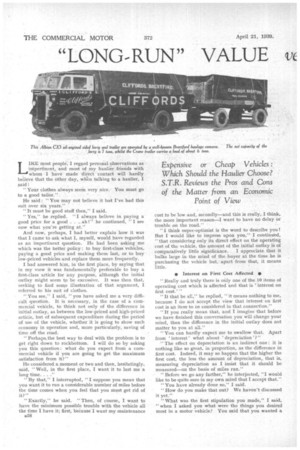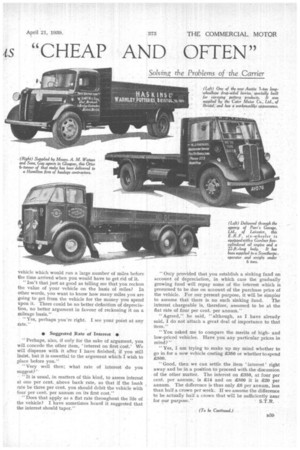"LONG-RUN" VALUE Ix
Page 94

Page 95

If you've noticed an error in this article please click here to report it so we can fix it.
Is "CHEAP AND OFTEN" LIKE most people', I regard personal observations as impertinent, and most of my haulier friends with . whom • I have made direct contact will hardly believe that the other day, when talking to a haulier, I said :
" Your clothes always seem very nice.. You must go to a good tailor."
He said: " You may not believe it but I've had this suit over six years."
" It must be good stuff then," I said.
" Yes," he replied. " I always believe in, paying a good price for a good . . .. ah !" he continued, "I see now what you're getting at."
And now, perhaps, I had better explain how it was that I came to ask what I, myself, would have regarded as an impertinent question. He had been asking me which was the better policy : to buy first-class vehicles, paying a good price and making them last, or to buy low-priced vehicles and replace them more frequently.
I had answered him, in the first place, by saying that in my view it was fundamentally preferable to buy a first-class article for any purpose, although the initial outlay might seem to be excessive. It was then that, seeking to find some illustration of that argument, I referred to his suit of clothes.
".You see," I said, "you have asked me a very difficult question. It is necessary, in the case of a commercial vehicle, to think not only of the difference in initial outlay, as between the low-priced and high-priced article, but of subsequent expenditure during the period of use of the vehicle, whether it is going to show such economy in operation and, more particularly, saving of time off the road.
" Perhaps.the best way to deal with the problem is to get right down to rockbottom. I will do so by asking you this question : what do you expect from a commercial vehicle if you are going to get the maximum satisfaction from it?"
He considered a moment or two and then, hesitatingly, said, " Well, in the first place, I want it to last me a long time. . . ."
'By that," I interrupted, "1 suppose you mean that you want it to run a considerable number of miles before the time comes when you feel that you must get rid of it?"
"Exactly," he said. "Then, of course, I want to have the minimum possible trouble with the vehicle all the time I have it; first, beCause I want my maintenance B58 cost to be low and, secondly—and this is really, I think, the more important reason—I want to have no delay or trouble on the road."
" I think super-optimist is the word to describe you! But I would like to impress upon you,I continued, " that considering only its direct effect on the operating cost of the vehicle, the amount of the initial outlay is of
comparatively little significance. I appreciate that it bulks large in the mind of the buyer at the time he is purchasing the vehicle but,apart from that, it means little.
• Interest on First Cost Affected •
"Really and truly there is only one of the 10 items of operating cost which is affected and that is 'interest on first cost.' "
"If that be all," he replied, "it means nothing to me, because I do not accept the view that interest on first cost is an item to De considered in that connection."
"If you really mean that, and I imagine that before we have finished this conversation you will change your mind, then the difference in the initial outlay does not matter to you at all."
"You can hardly expect me to swallow that. Apart from ' interest ' what about ' depreciation ' ?"
"The effect on depreciation is an indirect one : it is nothing like so great, in proportion, as the difference in first cost_ Indeed, it may so happen that the higher the first cost, the less the amount of depreciation, that is, measuring depreciation as I insist that it should be measured—on the basis of miles run."
"Before we go any farther," he interjected, "I would like to be quite sure in my own mind that I accept that." "You have already done so," I said.
"How do you make that out? We haven't discussed it yet."
"What was the first stipulation you made," I said, "when I asked you what were the things you desired most in a motor vehicle? You said that you wanted a
vehicle which would run a large number of miles before the time arrived when you would have to get rid of it. " Isn't that just as good as telling me that you reckon the value of your vehicle on the basis of miles? In other words, you want to know ho W many miles you are going to • get from the vehicle for the money you spend upon it. There could be no better definition of depreciation, no better argument in favour of reckoning it on a mileage basis."
'Yes, perhaps you're right. I see your point at any rate.' ' • Suggested Rate of Interest • " Perhaps, also, if only for the sake of argument, you will concede the other item, 'interest on first cost.' We will dispense with it after I have finished, if you still insist, but it is essential to the argument which I wish to place before you."
" Very well then; what rate of interest do you suggest?
" It is usual, in matters of this kind, to assess interest at one per cent, above bank rate, so that if the bank rate be three per cent, you should debit the vehicle with four per cent, per annum on its first cost."
"Does that apply as a flat rate throughout the life of the vehicle? I have sometimes heard it suggested that the interest should taper." " Only provided that you establish a sinking fund on account of depreciation, in which case the gradually growing fund will repay some of the interest which is presumed to be due on account of the purchase price of the vehicle. For our present purpose, it will be simplex to assume that there is no such sinking fund. The interest chargeable is, therefore, assumed to be at the flat rate of four per cent, per annum."
"Agreed," he said, "although, as I have already said, I do not attach a great deal of importance to that item."
"You asked me to compare the merits of highand low-priced vehicles. Have you any particular prices in mind?"
"Yes, I am trying to make up my mind whether to go in for a new vehicle costing £350 or whether to spend £500.
"Good, then we can settle the item ' interest ' right away and be in a position to proceed with the discussion of the other matter. The interest on £350, at four per cent. per annum, is £14 and on £500 it is £20 per annum. The difference is thus only £6 per annum, less than half a crown per week. If we assume the difference to be actually half a crown that will be sufficiently near for our purpose."'






































































































































